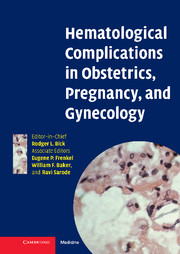Book contents
- Frontmatter
- Contents
- List of contributors
- Preface
- 1 Disseminated intravascular coagulation in obstetrics, pregnancy, and gynecology: Criteria for diagnosis and management
- 2 Recurrent miscarriage syndrome and infertility caused by blood coagulation protein/platelet defects
- 3 Von Willebrand disease and other bleeding disorders in obstetrics
- 4 Hemolytic disease of the fetus and newborn caused by ABO, Rhesus, and other blood group alloantibodies
- 5 Hereditary and acquired thrombophilia in pregnancy
- 6 Thromboprophylaxis and treatment of thrombosis in pregnancy
- 7 Diagnosis of deep vein thrombosis and pulmonary embolism in pregnancy
- 8 Hemorrhagic and thrombotic lesions of the placenta
- 9 Iron deficiency, folate, and vitamin B12 deficiency in pregnancy, obstetrics, and gynecology
- 10 Thrombosis prophylaxis and risk factors for thrombosis in gynecologic oncology
- 11 Low molecular weight heparins in pregnancy
- 12 Post partum hemorrhage: Prevention, diagnosis, and management
- 13 Hemoglobinopathies in pregnancy
- 14 Genetic counseling and prenatal diagnosis
- 15 Thrombocytopenia in pregnancy
- 16 Neonatal immune thrombocytopenias
- 17 The rational use of blood and its components in obstetrical and gynecological bleeding complications
- 18 Heparin-induced thrombocytopenia in pregnancy
- 19 Coagulation defects as a cause for menstrual disorders
- Index
- Plate section
- References
14 - Genetic counseling and prenatal diagnosis
Published online by Cambridge University Press: 01 February 2010
- Frontmatter
- Contents
- List of contributors
- Preface
- 1 Disseminated intravascular coagulation in obstetrics, pregnancy, and gynecology: Criteria for diagnosis and management
- 2 Recurrent miscarriage syndrome and infertility caused by blood coagulation protein/platelet defects
- 3 Von Willebrand disease and other bleeding disorders in obstetrics
- 4 Hemolytic disease of the fetus and newborn caused by ABO, Rhesus, and other blood group alloantibodies
- 5 Hereditary and acquired thrombophilia in pregnancy
- 6 Thromboprophylaxis and treatment of thrombosis in pregnancy
- 7 Diagnosis of deep vein thrombosis and pulmonary embolism in pregnancy
- 8 Hemorrhagic and thrombotic lesions of the placenta
- 9 Iron deficiency, folate, and vitamin B12 deficiency in pregnancy, obstetrics, and gynecology
- 10 Thrombosis prophylaxis and risk factors for thrombosis in gynecologic oncology
- 11 Low molecular weight heparins in pregnancy
- 12 Post partum hemorrhage: Prevention, diagnosis, and management
- 13 Hemoglobinopathies in pregnancy
- 14 Genetic counseling and prenatal diagnosis
- 15 Thrombocytopenia in pregnancy
- 16 Neonatal immune thrombocytopenias
- 17 The rational use of blood and its components in obstetrical and gynecological bleeding complications
- 18 Heparin-induced thrombocytopenia in pregnancy
- 19 Coagulation defects as a cause for menstrual disorders
- Index
- Plate section
- References
Summary
The purpose of this chapter is to discuss genetic counseling and prenatal diagnosis as it pertains to hematological complications in obstetrics and gynecology. The reader should be aware that, as with any text in a rapidly advancing field, some issues discussed might be outdated or new testing may have become available by the time of publication.
Many of the hematological conditions discussed in this book are hereditary (Table 14.1) and the specific nature of each disorder is discussed in the relevant chapter. It is the responsibility of the practitioner to explain to his or her patient, when applicable, the genetic nature of their condition. The practitioner should point out the increased risk for family members to be similarly affected, and encourage the patient to share this information. In many instances, this can be accomplished in the office of the treating physician. However, when patients have additional questions or concerns or difficulty comprehending or dealing with the genetic information, or there is a question regarding genetic testing, referral to a professional genetic counselor is appropriate.
In this chapter, we will first discuss genetic counseling and prenatal diagnosis in general. This will be followed by a discussion about the specific management of the following conditions:
Thrombophilia
Hemophilia
Hemoglobinopathies
Von Willebrand disease
Rh isoimmunization
Genetic counselors and genetic counseling
The National Society of Genetic Counselors has about 2,000 members, as of 2003. A directory of genetic counselors is available at the website, www.nsgc.org.
- Type
- Chapter
- Information
- Publisher: Cambridge University PressPrint publication year: 2006

